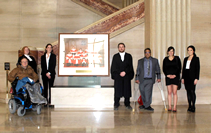Act Now

Empower U: Learn to Access Your Disability Rights Training on Canadian Human Rights, the Convention on the Rights of Persons with Disabilities (CRPD) and its Optional Protocol (OP) training aims to increase awareness of how to address discrimination using more familiar Canadian human rights laws such as Human Rights Codes and the newer international Convention on the Rights of Persons with Disabilities (CRPD). This is training for persons with disabilities by persons with disabilities. The training is part of a project funded by Employment and Social Development Canada and implemented by the Council of Canadians with Disabilities (CCD) in collaboration with Canadian Multicultural Disability Centre Inc. (CMDCI), Citizens With Disabilities – Ontario (CWDO), Manitoba League of Persons with Disabilities (MLPD) and National Educational Association of Disabled Students (NEADS). Read more.
Sign Up for our monthly digest
A monthly newsletter from CCD about what is happening in the community
Groups Seek "No" to Segregation of Disabled School-Children
Related Documents
April 17, 2024
Council of Canadians with Disabilities : 48 years strong and "On The Road to 50 Years"
March 21, 2024
Everyone has a responsibility to end racism
December 10, 2023
International Day of Human Rights
For Immediate Release
October 8, 1996
For decades, the prevailing attitude of educators was that like could only be taught with like. Even today, there remains a residue of sentiment among some school officials that unless all of a particular class-room's children require a similar amount of individualized attention, quality teaching cannot be conducted. Their solution? Special classes for these "children with special needs".
Four groups are challenging this as intervenors in a case that they hope will establish, once and for all, the principle that children in Canada have a basic right to be educated in accordance with any needs they may have, and in the company of children of a similar age and neighbourhood, irrespective of their disability. Along with Carol and Clayton Eaton, People First Canada, the Canadian Association for Community Living, Confederation des Organismes de Personnes Handicapées (COPHAN) and the Council of Canadians with Disabilities (CCD), are asking Canada's Supreme Court to uphold a significant lower court ruling. In February of 1995, the Ontario Court of Appeal found for the Eatons and against the Brant County Board of Education in a case involving the Board's refusal to provide schooling for their daughter, Emily, except in a segregated setting. The judgement was seen as particularly encouraging, coming on the heels of a Quebec court decision (circumstantially similar) that found against the parents of Danny Rouette. That decision persuaded Quebec's COPHAN to join the intervenors at the national level in the Eaton case. "Rouette allows local school-boards to use cost as a pretext for depriving disabled Quebec school-children of their equality rights," said COPHAN spokes-person Lucie Lemieux-Brassard. "If this kind of argument isn't refuted at the first opportunity, some irreversible policy steps could be taken soon—and in other provinces also," she said.
CCD Human Rights Committee chairperson, Hugh Scher, believes that much rides on the outcome of Eaton. "Emily Eaton's parents want equality for their daughter. A favourable conclusion of this case will underscore the point that you don't have appropriate accommodation until you have factored in equality," Scher said.
-30-
Mr. Hugh Scher, 416-515-9686 (business) 416-222-3590 (h)
Ms. Catherine Frazee 416-598-4638 ext. 328 (business) 416-924-5502 (h)

Some members of the CCD team at the Supreme Court of Canada on April 25, 2018 to intervene in S.A. v. Metro Vancouver Housing Corporation. (L. to R. Bob Brown, CCD Human Rights Committee member, Dianne Wintermute, legal counsel (ARCH), Dahlia James, a second year JD candidate at U. of Ottawa and Prof. Ravi Malhotra’s Research Assistant and Luke Reid, legal counsel (ARCH) , and Prof. Ravi Malhotra, a member of the Human Rights Committee, Prof. Anne Levesque, Chair of the Human Rights Committee, and Erin Carr, a second year JD candidate.
The Latimer Case
The Latimer case directly concerned the rights of persons with disabilities. Mr. Latimer's view was that a parent has the right to kill a child with a disability if that parent decides the child's quality of life no longer warrants its continuation. CCD explained to the court and to the public how that view threatens the lives of people with disabilities and is deeply offensive to fundamental constitutional values. Learn more.
